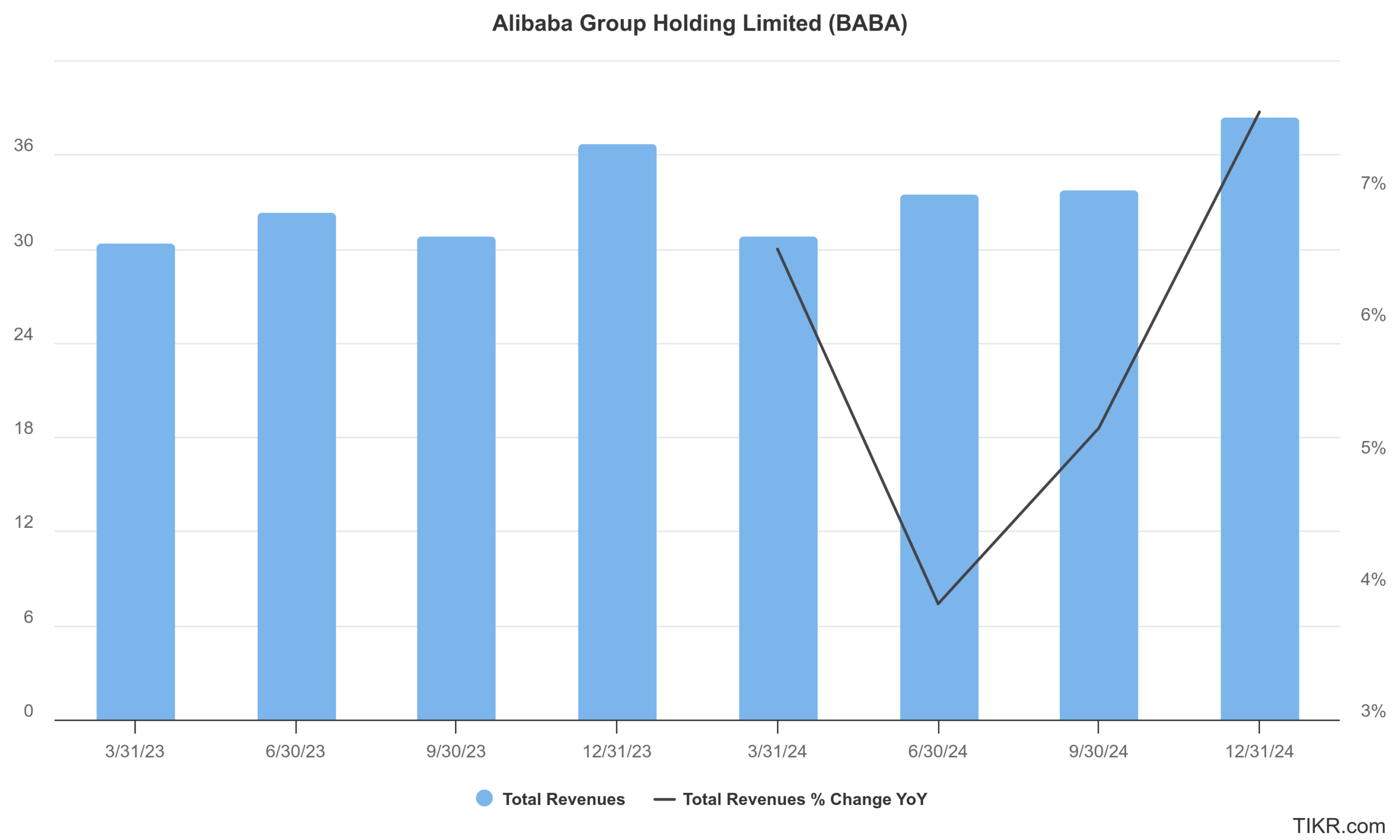Please note that we are not authorised to provide any investment advice. The content on this page is for information purposes only.
Alibaba stock (NYSE: BABA) is trading sharply lower in US price action today after the company missed fiscal Q4 2025 earnings estimates by a wide margin. Here are the key takeaways from the Chinese e-commerce giant’s fiscal Q4 earnings report.
Alibaba reported revenues of $32.6 billion in the March quarter, which were 7% higher YoY but slightly below consensus estimates. However, its net income of $1.6 billion was just about half of what analysts were expecting.
Alibaba Misses Q4 Earnings
Looking at the different business segments, Alibaba’s Chinese e-commerce business, which includes Taobao and Tmall group division, reported a 9% increase in revenues. Amid its sagging economic growth, China has taken several fiscal and monetary policy measures to spur growth.
China has set a 2025 GDP growth target of “around 5%.” The country raised its 2025 budget deficit target to “around 4%” of GDP, which is in line with estimates and 100 basis points higher than last year. While there are concerns over high debt, last year, the country said that it still has much room to raise the fiscal deficit.
Most analysts, however, expect China to ramp up support for its economy through the course of the year as the country navigates challenges on both the domestic and international fronts.
Alibaba Pointed to Strong Growth in AI Business
During the earnings call, Alibaba pointed to the strong growth in its artificial intelligence (AI) business. Alibaba’s cloud business reported an 18% YoY rise in Q4 revenues, which the company said was “primarily driven by an even faster public cloud revenue growth, including the increasing adoption of AI-related products.”
Previously, Alibaba has vowed to invest $52 billion towards AI and cloud computing over the next three years, which happens to be the single largest investment in this field from a Chinese private company.
Notably, Chinese tech companies have been launching low-cost AI models in a flurry ever since DeepSeek revealed that it had developed its AI model was just about $6 million, which is a fraction of rivals like OpenAI.
Alibaba has also been launching new models and in April it launched its Qwen3 series, hybrid reasoning models which it says gels “the capabilities of fast, simple responses and deeper chain-of-thought reasoning into a single model.”
“Our results this quarter and for the full fiscal year demonstrate the ongoing effectiveness of our ‘user first, AI-driven’ strategy, with core business growth continuing to accelerate. Driven by strong demand for AI, Cloud Intelligence Group quarterly revenue growth accelerated to 18%, with AI-related product revenue achieving triple-digit growth for the seventh consecutive quarter.”
He added, Customer management revenue at Taobao and Tmall Group grew 12% this quarter, reflecting the sustained impact of investments in user experience and effective monetization. Looking ahead, we will remain focused on our core businesses and continue to drive AI + Cloud as a new engine for our long-term growth,” said Eddie Wu, Chief Executive Officer of Alibaba Group.


Alibaba Previously Warned of an AI Bubble
Meanwhile, Alibaba Chairman Joe Tsai has warned of an AI bubble in the US. Speaking at the HSBC Global Investment Summit in Hong Kong earlier this year, Tsai said he was “astounded by the type of numbers that’s being thrown around” in the US.
“People are talking about $500 billion, several hundred billion dollars. I don’t think that’s entirely necessary. I think in a way, people are investing ahead of the demand that they’re seeing today,” added Tsai.
Notably, US tech giant including Microsoft, Alphabet, Amazon, and Microsoft have vowed to invest billions of dollars towards enhancing their AI capabilities including building data centers.
However, there are some signs of companies overestimating demand, and Microsoft has canceled leases for some data centers.
Chinese President Met Jack Ma in February
Last month, Chinese President Xi Jinping met the country’s entrepreneurs, including Alibaba’s co-founder Jack Ma, at a symposium. Ma’s participation in the event with Jinping becomes all the more important as the Chinese billionaire was the face of China’s crackdown on its tech moguls, whom the Communist Party believed had become too big for their shoes.
Analysts saw Xi’s meeting with tech leaders from companies such as Alibaba, Huawei, and DeepSeek as positive.
Alibaba Trades Below Its 2020 Highs
Alibaba stock peaked in late 2020. That year, China cracked down on Alibaba, and it had to cancel the IPO of its subsidiary Ant Financial. The tech crackdown only worsened in 2021, and although Alibaba paid a record $2.8 billion fine to settle the antitrust case, markets were not too convinced that the worst was over for the company.
Ma wasn’t seen in public for several weeks after the cancellation of Ant’s IPO in November 2020 and appeared in an online interaction only in January 2021. Ma’s participation in the event with Jinping became all the more notable as the Chinese billionaire was the face of China’s tech crackdown.
Chinese shares were almost “untouchable” for US investors after the 2021 tech crackdown. However, over the last year, several hedge funds have taken an optimistic view of China and added positions in Chinese companies.
Most recently, Ray Dalio’s Bridgewater Associates added Alibaba shares in Q1, the company’s 13F filing showed.
#Alibaba #Stock #Crashes #Massive #Earnings


